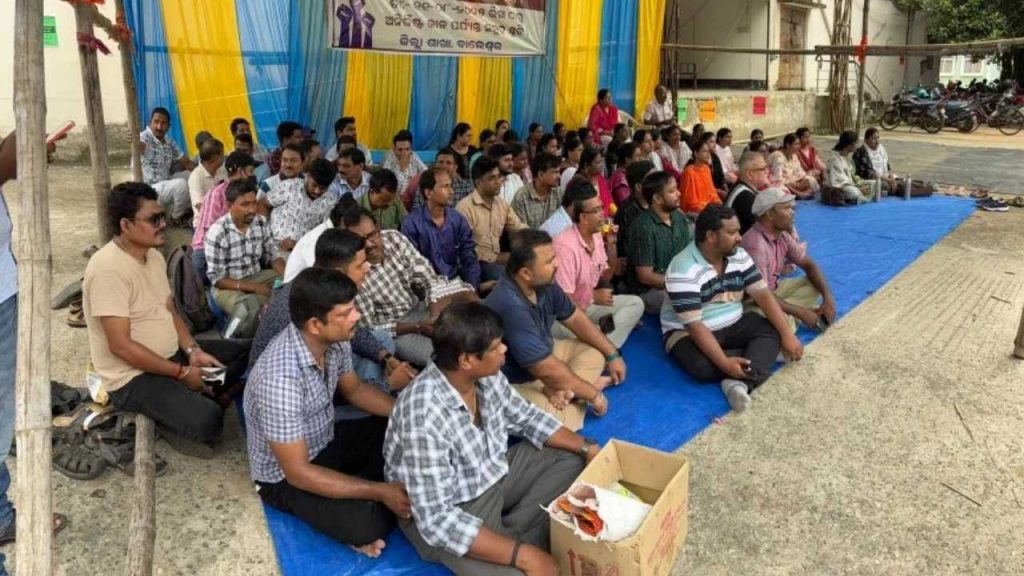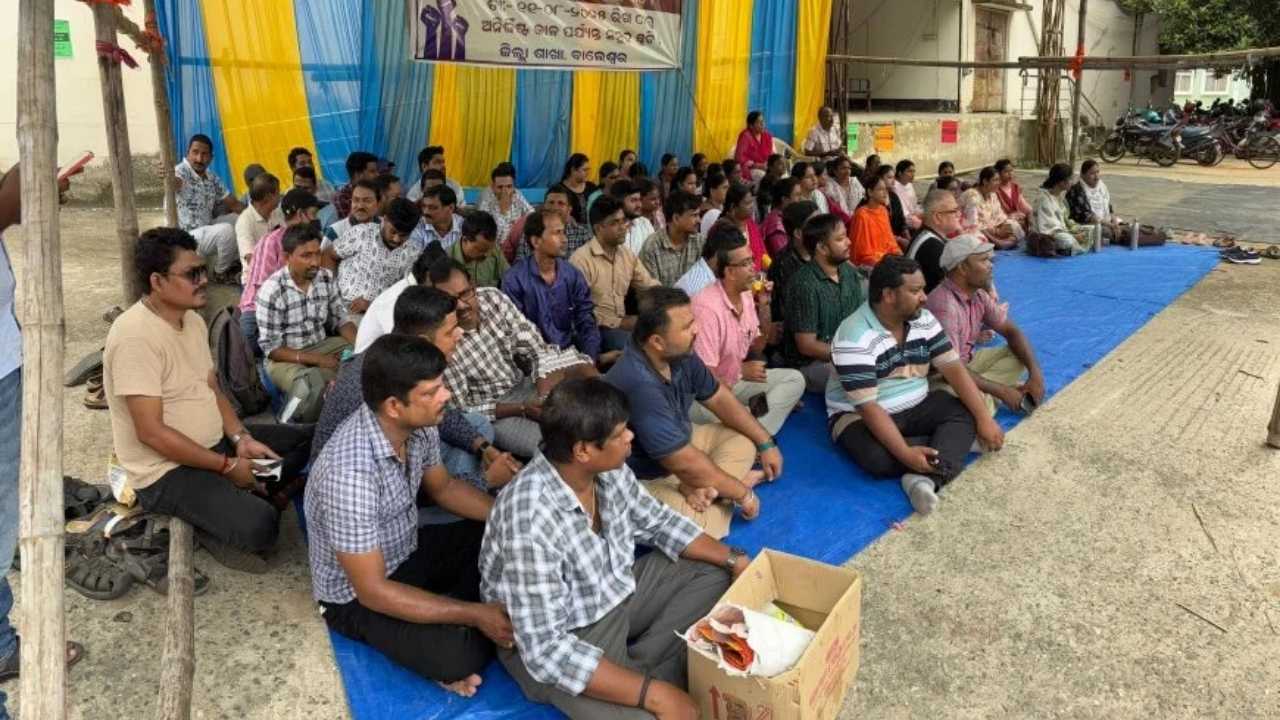The state of Odisha has been facing significant disruption as over 10,000 revenue employees, spread across 30 districts, have gone on strike. This industrial action, now in its fourth day as of August 14, 2025, is centered on a series of demands aimed at improving working conditions, pay structures, and retirement benefits for these employees. The strike, organized by the Odisha Rajaswa Amala Sangha (ORAS), has left citizens facing delays in essential public services such as land records issuance, income certificates, and other crucial revenue-related services. The Odisha government has urged the striking employees to return to work, emphasizing the need for a resolution through dialogue rather than through mass leave.

In this article, we will break down the situation in Odisha, the government’s response, and provide context to understand the ongoing issue, its impact on public services, and what this means for both the employees and the citizens of Odisha.
Odisha Government Urges Revenue Employees
| Key Points | Details |
|---|---|
| Strike Duration | Entered the fourth day on August 14, 2025 |
| Number of Employees Involved | Over 10,000 employees across 30 districts |
| Demands | Improved pay structures, enhanced health insurance, reinstatement of the Old Pension Scheme |
| Government’s Response | “No Work, No Pay” policy, disciplinary action threats, and appeals for dialogue |
| Key Official Involved | Revenue Minister Suresh Pujari and the Additional Chief Secretary of the Revenue Department |
| Impact on Citizens | Delays in services like land records, income certificates, and other revenue-related matters |
| Official Response | Rejection of mass leave, show-cause notices issued to employees |
| Employee Union Stance | Odisha Rajaswa Amala Sangha insists strike will continue until demands are met |
| Further Actions | Cadre restructuring being considered by the General Administration Department |
The strike by Odisha’s revenue employees has caused significant disruption in public services, leaving citizens frustrated and uncertain about when their critical documents will be processed. While the government has rejected the employees’ demands for immediate change, the situation is far from resolved. It is clear that both the government and the employees will need to find a way to engage in meaningful dialogue to restore normalcy.
In the meantime, citizens should stay informed, exercise patience, and consider alternatives to avoid delays in their essential services. As the situation continues to unfold, we hope that both parties can find common ground, ensuring that essential public services are not compromised in the future.
The Strike and Its Causes
The current strike involves employees working in Odisha’s revenue department, who handle critical services related to land records, income certificates, and other essential services that citizens rely on. These services are often needed for personal, business, and legal purposes, making any disruption particularly impactful.
The strike was sparked by a 10-point charter of demands, with key issues including:
- Pay Upgrades: The employees are asking for an increase in their salaries to match their work requirements and cost of living. This demand also includes better job security and benefits.
- Health Insurance: A better health insurance plan for government employees, ensuring that they have coverage that is sufficient for their needs.
- Old Pension Scheme: Many employees want the reinstatement of the old pension system, which they argue offers more long-term security compared to the newer pension schemes.
While these demands are aimed at improving the welfare of the employees, they have come at a time when citizens are facing delays and disruptions in key public services, resulting in frustration and inconvenience.

The Government’s Response
In response to the strike, the Odisha government has made it clear that it cannot afford to have critical services disrupted for an extended period. Revenue Minister Suresh Pujari has publicly appealed to the employees to end the strike and return to their duties. He emphasized that the state government is committed to resolving the issues through dialogue rather than through an indefinite strike. The Minister also made it clear that if the employees continued to be absent from work, the government would be forced to take disciplinary actions, including withholding their salaries and potential service breaks.
Additionally, the Additional Chief Secretary of the Revenue Department issued a directive to district collectors, advising them to reject leave applications from the striking employees and issue show-cause notices. The government also implemented the “No Work, No Pay” policy, meaning that employees who choose to strike would not be paid for the days they miss work.
The Impact of the Strike
The strike has had far-reaching consequences for both the government and the public. Here are some of the key impacts:
- Disruption of Services: One of the most immediate effects of the strike is the delay in essential public services. Land records, income certificates, and other important government documents are either not being processed or are being significantly delayed. This has left many citizens in a lurch, unable to complete essential paperwork needed for personal, legal, and business matters.
- Economic Consequences: The delayed processing of essential documents could also have a knock-on effect on the economy. For instance, people who need income certificates to apply for loans or for job opportunities may face significant delays. This, in turn, can affect their livelihoods and contribute to a slowdown in the local economy.
- Frustration Among Citizens: The strike has caused frustration among the citizens who rely on these services. Many have voiced their concerns over the lack of communication and the delays that have resulted in inconvenience.
What Can Be Done?
For both the government and the employees, the priority should be resolving the issues through constructive dialogue and negotiation. While the government has rejected the employees’ demands outright for the moment, it is still considering the issue of cadre restructuring, which could address some of the concerns regarding job security and promotions.
On the other hand, the employees have vowed to continue the strike until their demands are met, making it clear that they are unwilling to return to work unless the government takes their concerns seriously.
Practical Advice for the Public
If you are a resident of Odisha and have been affected by this strike, here are some practical steps you can take:
- Be Patient: Understand that this situation is temporary, and the government and employees are likely to reach some sort of resolution. While the delay in services is frustrating, it is important to be patient and avoid making hasty decisions.
- Stay Informed: Keep an eye on the official government channels and news outlets for any updates on the strike’s resolution. The Odisha government will likely issue statements or updates as the situation progresses.
- Explore Alternatives: In the meantime, check if there are any alternative channels to complete your paperwork. For example, some services may be available online, or through private agents, though be cautious of any additional fees.
Govt Report Reveals Fivefold Rise in EMRS School Dropouts, Chhattisgarh and Odisha Hit Hardest
Odisha Government Announces 22,896 Group C Posts for 2025, Deadline by August 31
Social Activist Shovana Mohanty to Lead Odisha’s State Commission for Women.
FAQs
Q1: What is the Odisha Rajaswa Amala Sangha (ORAS)?
A1: The Odisha Rajaswa Amala Sangha (ORAS) is the employees’ union for those working in the state’s revenue department. They are leading the ongoing strike, advocating for better pay, pension reforms, and better working conditions for their members.
Q2: What is the “No Work, No Pay” policy?
A2: The “No Work, No Pay” policy means that employees who participate in the strike and do not show up for work will not be paid for the days they miss. This policy has been enforced by the Odisha government as a response to the ongoing strike.
Q3: What are the demands of the striking employees?
A3: The employees are demanding an increase in pay, better health insurance, and the reinstatement of the Old Pension Scheme. They argue that these changes are necessary for their financial and social security.
Q4: How long will the strike last?
A4: The strike’s duration is uncertain, as the employees have vowed to continue until their demands are met. However, discussions and negotiations between the employees and the government could lead to a resolution at any time.




